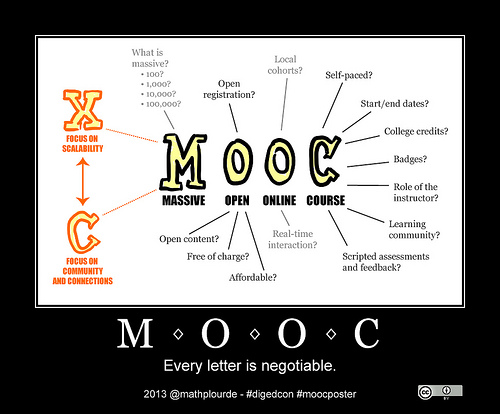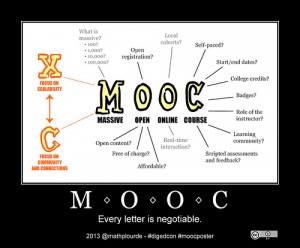
The March To Online Learning Continues
Just a quick post to point to two pieces of information that shows the slow march we’re seeing to online learning and how it is going to effect high schools in the near future. The disruption is near for sure.
A small study done by Millenial Branding with college students shows that many believe they can get as good if not better education online. Here are some figures from the survey.
50 percent of students said they don’t need a traditional classroom to learn, but 78 percent do think that it’s easier to learn in a traditional classroom than online. (associationsnow.com)
Not sure what to make of this. Is it a good thing or bad thing that 78% of students think it’s “easier” to learn in a traditional classroom? I have talked to people who have taken online courses and most do say they are more work as you can’t “hide” in an traditional class but not in an online course. I would have rather them say it was more educational or it was more “fun” to learn in a traditional classroom. Not sure what the questions were on the survey…but not sure I like “easier”.
43 percent say that online education will provide them with courses of the same or higher quality than traditional colleges. (associationsnow.com)
So not all of them believe online is the way to go….but they do believe it is the way education is headed. There are some other good stats to look at in the survey.
As this survey comes out asking millenials in college about online education, News. Corp’s Amplify launched a High School MOOC course. The first course is an AP Computer Science course and is aimed at preparing students to take the College Board exam.
The online program, taught by an experienced high school teacher, is free to students. And an added option, called MOOC Local, which provides schools with students in the CS MOOC additional resources, will cost $200 per student but is free to schools for the first year. (gigaom.com)

So if your school doesn’t offer AP Computer Science and you have students that want to take it, now they have a choice. The MOOC Local option looks like the future to me. Where a school has a “coach” who helps students when they need it, who can be that connection and even connect students within a school. Think how this could change what it means to be a teacher…..
Anyway….just two articles that have me thinking this week. It’s not that online learning has to be “better” than traditional. It just have to cost less, give students time to work a job, or fill a course need/want that their local school doesn’t offer to start making a mark on high school education. I think of these articles and the day I spent with Alabama ACCESSÂ online educators a few weeks ago where they have the third largest online high school serving over 65,000 students. Or as the director put it 65 – 1000 student high schools. We’re going to continue to see growth in this area and the MOOC approach will be part of it for sure.







Looking at the first quote I wonder what do students miss when learning online instead of in the classroom. It reminded me of conversations with colleagues about their own online learning experiences. They said they are missing the instant communication, the face to face conversations, and the quick exchange of information, knowledge, opinions, etc.. Also often they didn’t get enough feedback or not at all.
I think for many students/learners online courses only work if real collaboration is happening. They need to get the feeling that somebody cares, listens, and gives feedback. Ideally all possibilities for collaboration are provided and are used by the students. As soon as students realize that the personal aspect doesn’t disappear online learning will be more accepted and everybody will benefit from it. Probably the mass of students whatever age haven’t experienced collaborative, communicative and creative learning online. I see it because of Coetail but there is still a way to go. Let’s see what direction everything is heading to …
Agreed what is missed in most online courses and what you describe is the social aspect of face to face learning. A ver powerful part of the learning process. Learning is, in most cases a social activity and whether we are teaching in a traditional classroom or online we need to remember to create space and time to be social.
I currently teach in a traditional classroom at a local college. Online courses are becoming more prevalent to high students and adult learners. Is it easier? I would say no. At my local college students receive lecture in a traditional classroom setting, however homework assignments are completed online through programs such as Blackboard, e-campus, and MyMathLab. I find that with online courses you have to have discipline and will soon bypass the tradional classroom setting.
Ledora Alexander
i think that online classes should be promoted with the aim to impart high quality education and also to improve with respect to the traditional classrooms in terms on the social learning activity. Online classes can also be made social but this requires support and effort from both the sides: the teaching organisations as well as the students participating in these classes. for some it is easier and for some the traditional classroom but i guess with the advancement of technology everything should be adopted in a positive way.
The face-to-face aspect of traditional learning may be missing in online learning. But, I think that online learning allows a student to think more, be more involved in learning, instead of just sitting in a lecture room and listen to the teacher drone on.
Agree….I think we first have to understand that online learning is different. Therefore you design it differently as well. At this point in time I don’t think we can say it’s better or worse then face-to-face but rather different.